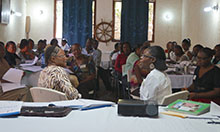
Source: Nicole Racine, SPRING.

Source: Teemar Fisseha, SPRING.
Recognizing USAID's and other donors' significant investments in training health care workers and the research gaps in effective and sustainable approaches to doing so at scale, SPRING is exploring two approaches to rolling out nutrition-related trainings in Haiti. Specifically, SPRING is seeking to measure the effectiveness of efforts to roll out trainings on the nutrition assessment, counseling, and support (NACS) approach and the comparative advantages and disadvantages of the on-the-job training (OJT) methodology with the more traditional approach of workshop-style trainings. The focus of this research is on seven facilities where SPRING began working in October 2013. Key research questions include:
- What is the capacity of master trainers (MTs) in NACS and infant and young child feeding (IYCF) counseling and as trainers?
- How receptive has health facility staff been to learning about NACS and IYCF through these OJT trainings? How does it compare to staff receiving traditional training?
- To what extent has the experiential learning cycle been followed by MTs?
- What knowledge and skills or practices have been gained and retained by health facility staff trained by OJT MTs? How does it compare to knowledge or skills of staff going through traditional training?
- What have been the costs (financial, opportunity costs, and effects on quality of care) to the facilities of rolling out the OJT trainings compared with traditional trainings?
The findings from the research are expected to guide the design of SPRING activities and the implementation of NACS programming with a continuum of care approach at the facility level reaching all ages, both men and women, as well as people who are HIV positive and negative.
Read about SPRING’s OJT approach in Haiti.
Read the story of a provider’s experience with OJT in Haiti.
Background
There are a number of specific actions that can positively impact maternal and child nutrition and significantly reduce mortality if sufficient programmatic coverage is achieved (Bhutta et al. 2013). These actions need to be taken by health care workers (HCWs), community members, pregnant women, and caregivers of children under two through a continuum of care and along the lifecycle. These interventions include delayed cord clamping, early initiation of breastfeeding and exclusive breastfeeding, kangaroo mother care, complementary feeding, family planning, psychosocial services, multiple micronutrient supplementation, vitamin K administration, and tobacco cessation (Bhutta et al. 2013).
Nutrition-related knowledge gaps must be addressed among HCWs. Effective and high quality training is critically needed to achieve sufficient programmatic coverage of proven nutrition strategies (Menon et al. 2014). Evidence has demonstrated that providing nutrition-related training for HCWs can improve daily energy intake of young children, frequency of feeding for children under two, and dietary diversity in children (Sunguya et al. 2013). Furthermore, provision of high quality training programs has been shown to strengthen HCW motivation leading to increased HCW retention (Healthy Child Uganda 2011; Kennedy 1991). In Nigeria, researchers implemented a two-day training of trainers for health extension workers to run district-level traditional trainings to promote exclusive breastfeeding. Intervention districts noted significantly higher rates of early initiation of breastfeeding and more knowledge about breastfeeding among HCWs (Davies-Adetugbo and Adebawa 1997). Unfortunately, little is known regarding specific training approaches – how trainings are conducted or rolled out and their comparative effectiveness in improving the provision of nutrition services or the impact of cost on frequency and quality of trainings.
The importance of and need for nutrition-related training is echoed in peer-reviewed literature and by program implementers and government counterparts; however, the actual process of how the trainings are conducted (length, depth, content, organization, etc.), and the impact of training costs on decisions related to training, are often not carefully considered, documented, reported, or evaluated. Specific to training related to nutrition services, there is even less evidence available. The majority of what is known about the training process for nutrition is based on qualitative review of project documents or experiences from implementation and these findings are not always consistent.
References
Al-Ali, S. (1996). An Assessment of On-the-Job Training Programs in the Ministry of Finance (MOF): A Case Study of Kuwait. Human Resource Planning. 1996; 19, 2.
Bhutta , Z., Das, J., Rizvi, A., et al. (2013). Evidence-based interventions for improvement of maternal and child nutrition: what can be done and at what cost? The Lancet. 382: 452-477.
Davies-Adetugbo, AA. , Adebawa, HA. (1997). The Ife south breastfeeding project: training community health extension workers to promote and manage breastfeeding in rural communities. Bulletin of the World Health Organization. 75(4): 323-332.
Kennedy, E. 1991. Successful Nutrition Programs in Africa: What Makes Them Work? Washington DC: World Bank.
Menon, P., Covic, N., Harrigan, P., et al. (2014). Strengthening implementation and utilization of nutrition interventions through research: a framework and research agenda. Annals of the New York Academy of Sciences. 1-21.
Sunguya, B., Poudel, K., Mlunde L., Shakya, P., Urassa, D., Jimba, M., Yasuoka, J. (2013). Effectiveness of training of health workers towards improving caregivers’ feeding practices for children age 6 months to two years: a systematic review. Nutrition Journal. 12:66.

